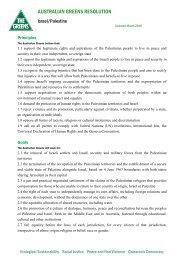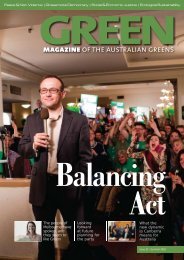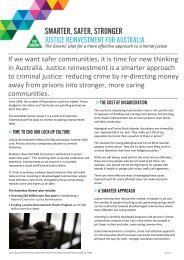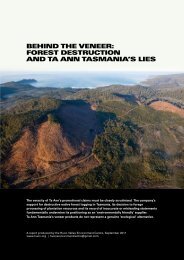news & views - Australian Greens
news & views - Australian Greens
news & views - Australian Greens
Create successful ePaper yourself
Turn your PDF publications into a flip-book with our unique Google optimized e-Paper software.
Autumn 2007 ISSUE 22 PAGE 6<br />
This aspirational life<br />
the challenge to make meaning<br />
Looking behind the glitter<br />
Advertisers equate the consumer lifestyle with cherished<br />
notions of happiness, security and fulfillment. And let’s be<br />
clear – there is no nobility in poverty. Material sufficiency<br />
is central to human survival and personal dignity. But the<br />
current obsession with material acquisition in societies like<br />
Australia’s has outstripped valid concerns about survival -<br />
or even about living modestly and comfortably. In so doing, it<br />
has produced a paradox. Instead of living well, many live with<br />
increasing levels of ‘dis-ease’.<br />
Along with environmental damage, the most obvious symptoms<br />
of dis-ease are increasingly acknowledged. They include<br />
widespread stress, depression, and pandemic-scale obesity.<br />
Mostly, the symptoms are given band-aid treatments.<br />
The deeper causes remain undiagnosed and untreated.<br />
A commodified sense of the world<br />
Aspirational consumption rests on a commodified sense of the<br />
world. Increasingly, aspects of human existence that should<br />
never be commodified are being reduced to inappropriate<br />
material measures.<br />
For example, many people seem to describe and measure their<br />
own identity and worth in material terms. Popular advertising<br />
both reflects and encourages this - the Seiko ad that proclaims<br />
‘It’s not your car. It’s not your friends. It’s not your job. It’s your<br />
watch that tells most about who you are’ is a telling but not<br />
unusual example.<br />
Similar material criteria are often applied when people engage<br />
with others. A startling study by Barbara Pocock and Jane<br />
Clarke (Can’t Buy Me Love, Australia Institute 2004) revealed<br />
that <strong>Australian</strong> teenagers live ‘within a powerful force field of<br />
competitive consumption’ and that ‘the costs of falling behind<br />
are seen to be high – teasing, not fitting in, feeling bad, failing<br />
socially’ (p.xi). Targetting adults, luxury car-maker Maserati<br />
exploited the same ‘force field’ with its ad cleverly captioned<br />
‘Have your life flash before other people’s eyes’.<br />
JOHN HILLCOAT AND BRIAN HOEPPER<br />
Last Christmas, the festive season again delivered a deluge of advertising to <strong>Australian</strong>s. The spirit of Christmas came<br />
gift-wrapped with tags inscribed ‘bigger’, ‘faster’ and ‘more luxurious’. Lovable Saint Nick carried a sack to gladden the<br />
heart of all ‘aspirationals’.<br />
With Christmas over, the seductive messages about the good life did not disappear. And with the federal election<br />
looming, politicians of the major parties will take up the slogans. For aspirational values lie at the heart of the vision they<br />
promote.<br />
Because aspirational goals involve the relentless growth of production, acquisition and consumption, they are fairly<br />
easy targets for green critique. Aspirational lifestyles leave oversized ecological footprints stamped across the planet. In<br />
environmental terms, living aspirationally seems incompatible with living sustainably.<br />
But let’s allow ourselves a brief flight of fancy. Let’s imagine that aspirational material dreams could be met without<br />
compromising environmental sustainability. Could people then live ‘the good life’ and ‘live sustainably’?<br />
A crisis of meaning making<br />
However, measuring worth and identity through material<br />
possessions is a tragically flawed way of making sense of the<br />
world, particularly as the urge to make meaning out of life is<br />
a central human need. Decades ago, Erich Fromm alerted us<br />
to the folly of this in his To Have or To Be. More recently,<br />
Cushman and others have described the ‘empty self’ – the<br />
sense of unfulfilment that returns after the ‘fleeting sense of<br />
satisfaction’ produced by so-called ‘retail therapy’. For many,<br />
the remedy – paradoxically unsatisfying – is to plunge into a<br />
further cycle of acquisition. And thus a deep human yearning<br />
remains unfulfilled. As Clive Hamilton and Richard Denniss<br />
noted in Affluenza, ‘people who construct their identity from<br />
what they consume basically don’t know who they are’.<br />
Social sustainability<br />
If lack of meaning is commonplace in a culture then<br />
loneliness, depression, anxiety and destructiveness become<br />
widespread – another prescient observation by Fromm.<br />
Relationships within communities and societies suffer. Social<br />
sustainability is threatened.<br />
Social sustainability is threatened further by the closely<br />
related influences of our fast paced lifestyles and the culture<br />
of overwork that many people embrace to pay for aspirational<br />
ways of life. Again, Pocock and Clarke’s study explored some<br />
related dimensions of this – parental exhaustion, children’s<br />
resentment and time-poor relationships. They described<br />
guilt-ridden parents compensating their children with material<br />
goods. Workplaces can also be sites where unhealthy levels of<br />
individualism and competitiveness can prevail - mirroring the<br />
‘competitive force field’ of consumption mentioned above. In a<br />
recent ‘Modern Dilemma’ column in The Weekend <strong>Australian</strong>,<br />
‘humanist’ Ruth Ostrow gave the following advice to a worker<br />
expressing qualms about sacking junior staff – ‘Grow up. … If<br />
you want to leave the ranks of drone monkeys and join planet<br />
of the apes then you have to learn how to beat your breast,<br />
take power, and make tough, unpleasant and often unkind<br />
decisions.’












